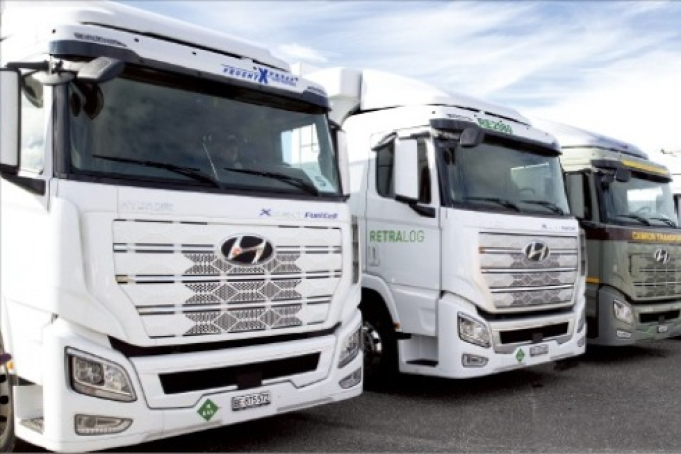Hyundai to debut car-carrier hydrogen trucks in H2
The carmaker took over hydrogen fuel cell production facilities from Hyundai Mobis this week
By Jun 13, 2024 (Gmt+09:00)
When in S. Korea, it’s a ritual: Foreigners make stops at CU, GS25, 7-Eleven


Maybe Happy Ending: A robot love story that rewrote Broadway playbook


NPS yet to schedule external manager selection; PE firms’ fundraising woes deepen


Samsung steps up AR race with advanced microdisplay for smart glasses


Seoul appeal: Korean art captivates Indonesia’s affluent connoisseurs



Hyundai Motor Co. plans to roll out car carrier trailers and refrigerator trucks powered by hydrogen in the second half of this year with a focus on the US market, about four years after it debuted its XCIENT hydrogen fuel cell truck, the South Korean carmaker said on Wednesday.
It will also expand the lineup of its hydrogen fuel cell vehicles into express and low-floor intercity buses by early 2027, while developing what would be the world’s first hydrogen-powered supercar for launch in 2026.
In October 2020, the XCIENT hydrogen truck hit the market in Switzerland.
Since then, Swiss transportation companies have bought 48 units of the hydrogen fuel cell truck and have driven them a total of 10 million kilometers. That mileage is equivalent to circling the earth, with its circumference of 40,075 km, 240 times.

XCIENT is the world's first mass-produced, hydrogen-powered heavy truck. It sells for 600 million-800 million won ($437,000-$583,000) per unit.
The zero-emission truck is fitted with a 180-kilowatt (kW) hydrogen fuel cell system consisting of two hydrogen fuel cells and a drive motor with a maximum output of 350 kW.
They can drive up to 400 km on a single charge.
To improve the mileage of hydrogen trucks and buses, Hyundai is working to increase the electricity production of hydrogen fuel cell stacks that convert chemical energy to electrical energy through an electrochemical reaction between hydrogen and oxygen to 200kW from 180kW.
Early this week, Hyundai Motor took over hydrogen battery pack assembly facilities from its affiliated auto parts company Hyundai Mobis Co. to take charge of both the development and production of fuel cell packs.
Write to Jae-Fu Kim and Jin-Won Kim at hu@hankyung.com
Yeonhee Kim edited this article.
-

-
 Electric vehiclesHyundai to develop hydrogen supercar for launch in 2026
Electric vehiclesHyundai to develop hydrogen supercar for launch in 2026May 20, 2024 (Gmt+09:00)
3 Min read -
 Electric vehiclesHyundai set for revamped hydrogen-powered NEXO launch in Q2 2025
Electric vehiclesHyundai set for revamped hydrogen-powered NEXO launch in Q2 2025May 06, 2024 (Gmt+09:00)
2 Min read -
 Hydrogen economyHyundai to expand US hydrogen truck business with California nonprofit
Hydrogen economyHyundai to expand US hydrogen truck business with California nonprofitMay 03, 2024 (Gmt+09:00)
2 Min read -
 Hydrogen economyHyundai, Kia join hands with Gore to develop hydrogen fuel cell material
Hydrogen economyHyundai, Kia join hands with Gore to develop hydrogen fuel cell materialJan 05, 2024 (Gmt+09:00)
2 Min read -
 Korean innovators at CES 2024Hyundai Motor’s themes at CES 2024: Hydrogen, software
Korean innovators at CES 2024Hyundai Motor’s themes at CES 2024: Hydrogen, softwareDec 21, 2023 (Gmt+09:00)
1 Min read -
 BatteriesHyundai Motor, Kia develop ultra-high-temp hydrogen fuel cells with US firm
BatteriesHyundai Motor, Kia develop ultra-high-temp hydrogen fuel cells with US firmMar 23, 2023 (Gmt+09:00)
1 Min read -
 AutomobilesHyundai's Nexo keeps 1st place in hydrogen car market beating Toyota
AutomobilesHyundai's Nexo keeps 1st place in hydrogen car market beating ToyotaJan 05, 2023 (Gmt+09:00)
1 Min read


